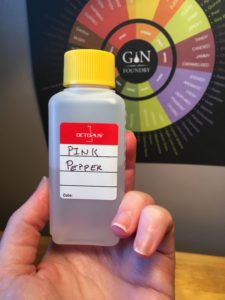 Audemus Pink Pepper gin hails from Cognac in France, when founders Bob and Bert met in 2014, over soup. Obviously. Their Pink Pepper gin is widely known as their flagship product and they dedicate each batch of their gin to their family, friends and people who have helped the brand over the years. They say the flavour changes as you drink the gin. The first prominent flavours are pink peppercorns (yup, who’d have thunk it), juniper and cardamom, however when served over ice the vanilla, tonka and honey come out. I’m very excited about trying this – on which note I’d like to thank Orla for kindly donating a sample to me. I highly encourage you to check out her Instagram account to see her puppies Kyuss and Paloma. Continue reading
Audemus Pink Pepper gin hails from Cognac in France, when founders Bob and Bert met in 2014, over soup. Obviously. Their Pink Pepper gin is widely known as their flagship product and they dedicate each batch of their gin to their family, friends and people who have helped the brand over the years. They say the flavour changes as you drink the gin. The first prominent flavours are pink peppercorns (yup, who’d have thunk it), juniper and cardamom, however when served over ice the vanilla, tonka and honey come out. I’m very excited about trying this – on which note I’d like to thank Orla for kindly donating a sample to me. I highly encourage you to check out her Instagram account to see her puppies Kyuss and Paloma. Continue reading
brighton
Regency Tonic
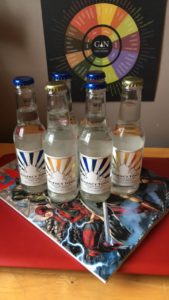 In case you didn’t know this about me, I live in Brighton. Well, Hove actually. Regency Tonic come from three roads away from me (and after chatting to co-founder Rich, it turns out he used to live just three doors away from me, small world). Regency’s aim was to create a tonic low in sugar so that you can #tasteyourgin – their original gold tonic contains just 1.3g per 100ml which is less than the Fever Tree Naturally Light tonic. Rich admits himself that this is quite divisive for consumers – the dryness of the tonic doesn’t compliment every single gin and needs to be paired with a slightly sweeter one to balance it out. So, to widen their reach they have just launched their new blue tonic. This has a higher sugar content to make it taste more like a traditional tonic and hopefully to appeal to a wider market. Continue reading
In case you didn’t know this about me, I live in Brighton. Well, Hove actually. Regency Tonic come from three roads away from me (and after chatting to co-founder Rich, it turns out he used to live just three doors away from me, small world). Regency’s aim was to create a tonic low in sugar so that you can #tasteyourgin – their original gold tonic contains just 1.3g per 100ml which is less than the Fever Tree Naturally Light tonic. Rich admits himself that this is quite divisive for consumers – the dryness of the tonic doesn’t compliment every single gin and needs to be paired with a slightly sweeter one to balance it out. So, to widen their reach they have just launched their new blue tonic. This has a higher sugar content to make it taste more like a traditional tonic and hopefully to appeal to a wider market. Continue reading
Pickering’s Gin – 2017 Tattoo edition
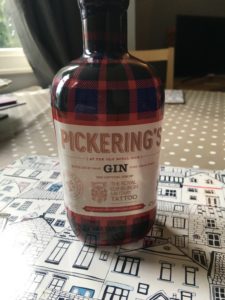 If you’re in Edinburgh, I can recommend the Pickering’s Distillery tour. Well. By tour it’s standing in one room talking all about gin, then going next door and seeing their bottling room, then back to the first room to drink gin. It’s accessed through the Royal Dick Bar (tee hee hee) at Summerhall roundabout. I went during the festival and was joined by my father, who at the end very kindly got me a bottle of the limited edition 2017 Tattoo gin. Working with the Royal Edinburgh Military Tattoo organisers, this year’s edition features indigenous Scottish heather, milk thistle, bog myrtle and Scots Pine added to their Bombay recipe gin wrapped in the official tartan of the Tattoo (not McLaren tartan though as my father pointed out…). Along with the Tattoo gin, their range features their original gin, a navy strength gin and the 1947 recipe (made precisely to their original recipe). They’re also the makers of the original gin baubles that are LITERALLY ALL OVER SOCIAL MEDIA. The bottle is lovely, they have paid real attention to the small details – the Pickering’s peacock wrapped around the bottle and a charming scale of how empty the bottle is on the side.
If you’re in Edinburgh, I can recommend the Pickering’s Distillery tour. Well. By tour it’s standing in one room talking all about gin, then going next door and seeing their bottling room, then back to the first room to drink gin. It’s accessed through the Royal Dick Bar (tee hee hee) at Summerhall roundabout. I went during the festival and was joined by my father, who at the end very kindly got me a bottle of the limited edition 2017 Tattoo gin. Working with the Royal Edinburgh Military Tattoo organisers, this year’s edition features indigenous Scottish heather, milk thistle, bog myrtle and Scots Pine added to their Bombay recipe gin wrapped in the official tartan of the Tattoo (not McLaren tartan though as my father pointed out…). Along with the Tattoo gin, their range features their original gin, a navy strength gin and the 1947 recipe (made precisely to their original recipe). They’re also the makers of the original gin baubles that are LITERALLY ALL OVER SOCIAL MEDIA. The bottle is lovely, they have paid real attention to the small details – the Pickering’s peacock wrapped around the bottle and a charming scale of how empty the bottle is on the side.
Tyree Gin
Note: I contacted Tyree Gin to see if they would send me a sample for the blog and they were kind enough to do so – as always, I’ll be honest about what I think
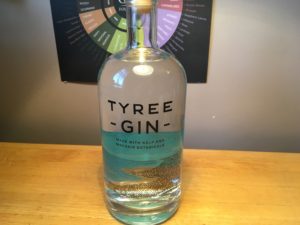
Tyree Gin hails from the Hebridean island of Tiree (go to Oban and go west past Mull and you reach it). Tiree is only 12 miles long but three miles wide, and very flat. They do however seem to have lots of local botanicals on this small, windy patch of land in the sea. The soil on Tiree is what is known as machair – a combination of soil and sand, unique to Scotland. From here they gather eyebright (a flower that can help eye infections), Ladies Bedstraw (yellow flowers that smell slightly of honey), Water Mint (a form of mint…that grows in water…) and Angelica, combined with local kelp from the Atlantic Ocean. Their kelp forests are the fourth largest in Scotland don’tcha know. So, you’ve probably noticed that Tyree Gin is not spelt the same as their island namesake. Well, Tyree is the original spelling of Tiree’s Post Office – dating back to 1802. But it was changed in 1889 to avoid confusion with Tyrie in Aberdeenshire. So that’s that.
Dutch Gin Tasting Night
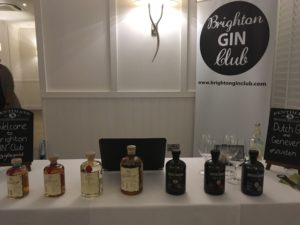 If you follow my Instagram stories you’ll know that a little while ago I went to a gin and cheese night hosted by Brighton Gin Club at La Cave a Fromage. When I was there I got chatting to the team and mentioned that they were combining my two loves – gin and organising events (#eventsprof). They then told me about one of their upcoming events, a night of dutch genever and gin. They kindly invited me along, so I jumped at the chance (and dragged the boy along with me).
If you follow my Instagram stories you’ll know that a little while ago I went to a gin and cheese night hosted by Brighton Gin Club at La Cave a Fromage. When I was there I got chatting to the team and mentioned that they were combining my two loves – gin and organising events (#eventsprof). They then told me about one of their upcoming events, a night of dutch genever and gin. They kindly invited me along, so I jumped at the chance (and dragged the boy along with me).
Isle of Wight Distillery
Note: I met Isle of Wight Distillery at both Junipalooza and Imbibe Live and they kindly sent me a sample pack to try. As always, I’ll let you know if I don’t like it.
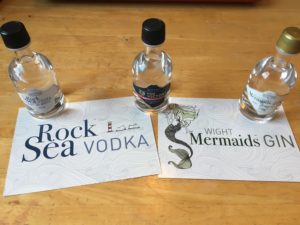 Guess where the Isle of Wight Distillery come from? Based at Rosemary Vineyard, they are the first and only distillery (with a license!) on the Isle of Wight. They started with their Mermaid Gin followed by their Rock Sea Vodka and their HMS Victory Navy Strength Gin. They also have an Apple Pie Moonshine which sounds INCREDIBLE, but I don’t have a sample of that to try so whatevs I don’t care. They use locally foraged, hand picked ingredients in their gin such as Rock Samphire (from a secret location, they won’t tell you where they get it from), along with
Guess where the Isle of Wight Distillery come from? Based at Rosemary Vineyard, they are the first and only distillery (with a license!) on the Isle of Wight. They started with their Mermaid Gin followed by their Rock Sea Vodka and their HMS Victory Navy Strength Gin. They also have an Apple Pie Moonshine which sounds INCREDIBLE, but I don’t have a sample of that to try so whatevs I don’t care. They use locally foraged, hand picked ingredients in their gin such as Rock Samphire (from a secret location, they won’t tell you where they get it from), along with 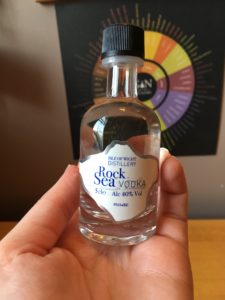 Isle of Wight grown hops and coriander seeds plus a touch of elderflower and grains of paradise. The Navy Strength gin is made in partnership with The National Museum of the Royal Navy using the same recipe but bottled at the higher 57% ABV to make the flavours more intense. Plus, for the first time on this blog, they have a vodka – grain distilled with the addition of rock sea salt and bottled at 40% ABV.
Isle of Wight grown hops and coriander seeds plus a touch of elderflower and grains of paradise. The Navy Strength gin is made in partnership with The National Museum of the Royal Navy using the same recipe but bottled at the higher 57% ABV to make the flavours more intense. Plus, for the first time on this blog, they have a vodka – grain distilled with the addition of rock sea salt and bottled at 40% ABV.
The Tonic Taste Test – part 3
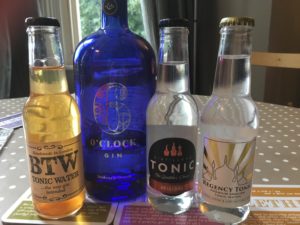 We’re made it to the third, and final (for now), part of my tonic taste tests. After testing the market leaders and the large ranges, today we try the one off brands. Namely, Regency Tonic, Distillers Tonic and BTW Tonic.
We’re made it to the third, and final (for now), part of my tonic taste tests. After testing the market leaders and the large ranges, today we try the one off brands. Namely, Regency Tonic, Distillers Tonic and BTW Tonic.
The Tonic Taste Test – part 2
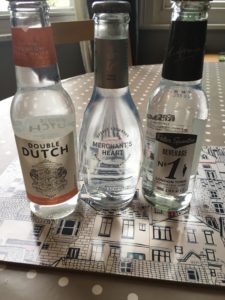 For those that missed it, I conducted a blind taste test of Fever Tree, Fentimans and Franklin and Sons tonic waters (in the name of science of course). After checking out the three market leaders, today I’m focusing on what I’m calling “the tonic ranges”. So called because they each have a wide range of flavoured mixers to their name, today I’m still only trying their original tonic’s (there will be later blogs about the whole range). So, what are we trying?
For those that missed it, I conducted a blind taste test of Fever Tree, Fentimans and Franklin and Sons tonic waters (in the name of science of course). After checking out the three market leaders, today I’m focusing on what I’m calling “the tonic ranges”. So called because they each have a wide range of flavoured mixers to their name, today I’m still only trying their original tonic’s (there will be later blogs about the whole range). So, what are we trying?
Caspyn Gin
Note: I met the team behind Caspyn Gin at Imbibe Live and they kindly sent me some samples post-event. As always, I’ll let you know if they’re grim.
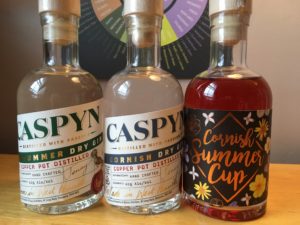 Caspyn Gin is the product of Pocketful of Stones distillery, yet another craft gin from Cornwall – this time in Long Rock, just outside Penzance. They currently produce two gins – the Cornish Dry and Midsummer Dry – as well as the Cornish Summer Cup. The original Caspyn gin is loaded with floral and citrus notes using the less regularly used botanicals hibiscus flowers, Japanese tea, gorse and lemongrass. The Midsummer version takes the original gin and infuses it with fresh English cucumbers. This leaves the gin with a slight green tinge (apparently, I can’t quite spot it). The Cornish Summer Cup is their take on the English cup (aka a Pimms to us plebs) loaded with fruit such as raspberries and strawberries mixed with star anise and wild carrot seeds. So all in all, for a small batch distillery, they’ve got a lot going on – there’s an Absinthe in the pipelines. And, more importantly, my bottles arrived with my name on them. So they’re the best.
Caspyn Gin is the product of Pocketful of Stones distillery, yet another craft gin from Cornwall – this time in Long Rock, just outside Penzance. They currently produce two gins – the Cornish Dry and Midsummer Dry – as well as the Cornish Summer Cup. The original Caspyn gin is loaded with floral and citrus notes using the less regularly used botanicals hibiscus flowers, Japanese tea, gorse and lemongrass. The Midsummer version takes the original gin and infuses it with fresh English cucumbers. This leaves the gin with a slight green tinge (apparently, I can’t quite spot it). The Cornish Summer Cup is their take on the English cup (aka a Pimms to us plebs) loaded with fruit such as raspberries and strawberries mixed with star anise and wild carrot seeds. So all in all, for a small batch distillery, they’ve got a lot going on – there’s an Absinthe in the pipelines. And, more importantly, my bottles arrived with my name on them. So they’re the best.
Mayfield Sussex Hop Gin
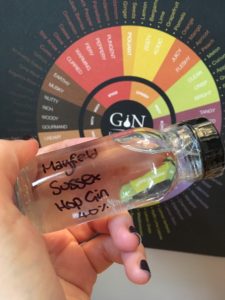 Mayfield Gin is the brain child of James Rachham – who also founded the artisanal spirits company Emporia Brands. Growing their hops in just one acre of a 30 acre farm in Salehurst (for anyone else whose geography is a bit iffy, go north from Hastings but not as far as Tunbridge Wells) which gives a citrus edge to the hoppy gin. The Sussex Hops are distilled with juniper, orange and lemon peel, angelica root, coriander seed, liquorice and orris root. I have high hopes for this – nothing gimmicky or random has been thrown in.
Mayfield Gin is the brain child of James Rachham – who also founded the artisanal spirits company Emporia Brands. Growing their hops in just one acre of a 30 acre farm in Salehurst (for anyone else whose geography is a bit iffy, go north from Hastings but not as far as Tunbridge Wells) which gives a citrus edge to the hoppy gin. The Sussex Hops are distilled with juniper, orange and lemon peel, angelica root, coriander seed, liquorice and orris root. I have high hopes for this – nothing gimmicky or random has been thrown in.